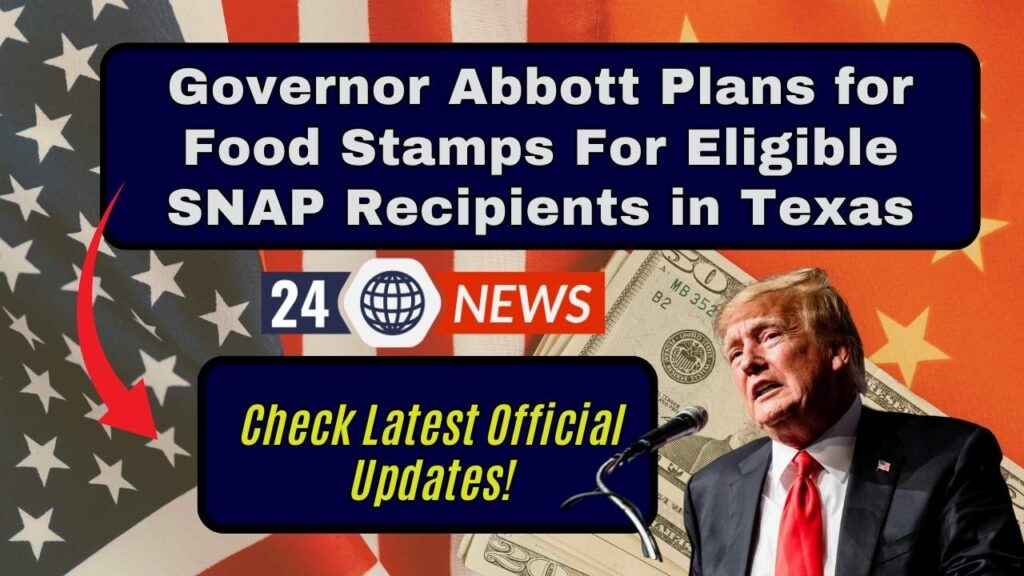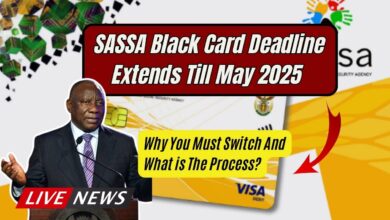Governor Abbott Plans for Food Stamps For Eligible SNAP Recipients in Texas: Check Latest Official Updates!
SNAP Recipients in Texas – The Governor Abbott plans for food stamps for eligible SNAP recipients in Texas have stirred significant discussion across the Lone Star State. If you’re a SNAP recipient or simply want to understand how these changes might affect Texas families, this article breaks it all down in a way that’s easy to grasp and packed with practical insights.

Governor Greg Abbott recently announced plans to implement new guidelines aimed at improving the nutritional impact of SNAP (Supplemental Nutrition Assistance Program) benefits in Texas. The initiative focuses on restricting the purchase of certain unhealthy foods using food stamps. This move reflects growing concerns about diet-related health issues and aims to align SNAP with promoting healthier food choices among low-income households.
In this comprehensive guide, we’ll walk you through the latest official updates on this topic, explain what it means for Texans, provide practical advice for recipients, and offer credible resources to help you stay informed.
SNAP Recipients in Texas
| Aspect | Details |
|---|---|
| Governor | Greg Abbott |
| Program Affected | Supplemental Nutrition Assistance Program (SNAP) |
| Scope | Texas, affecting approximately 3.2 million SNAP recipients |
| Main Proposal | Restrict purchases of sugary drinks, candy, and highly processed foods using SNAP benefits |
| Legislation Reference | Senate Bill 379 (SB 379), passed in Texas Senate, pending Texas House vote |
| Key Affected Items | Energy drinks, cookies, chips, candy, soda |
| Goal | Promote healthier eating habits and reduce diet-related health issues |
| Implementation Status | Waiver request submitted to USDA, pending approval |
| Additional Measures | Automatic SNAP benefit replacements after natural disasters |
| Official Resources | Texas Health and Human Services SNAP Info |
Governor Abbott’s plans for food stamps for eligible SNAP recipients in Texas signal a notable shift toward promoting healthier eating habits among low-income Texans. While the intentions behind restricting unhealthy purchases are clear—improving nutrition and reducing diet-related diseases—the approach raises important questions about access, autonomy, and practical implementation.
For SNAP recipients, staying informed and adapting to changes will be crucial. Leveraging available nutrition education, planning grocery shopping mindfully, and engaging with policymakers can help Texans navigate this evolving landscape.
Understanding the SNAP Program and Governor Abbott’s Proposal
Before diving into the nitty-gritty, let’s get on the same page about what SNAP is all about. The Supplemental Nutrition Assistance Program (SNAP) is a federally funded program that helps millions of low-income Americans buy food. Texas alone serves about 3.2 million recipients through SNAP, providing essential support to families, seniors, and individuals facing economic hardship.
Governor Abbott’s plan centers around a waiver request submitted to the United States Department of Agriculture (USDA). The waiver seeks permission to restrict the use of SNAP benefits on certain items deemed unhealthy, such as sugary beverages, candy, and processed snacks. The idea is to steer the program back to its roots—ensuring food stamp benefits are used to purchase nutritious, wholesome foods.
Why the Change Now?
Studies show that many diet-related illnesses—like diabetes and heart disease—are disproportionately common in low-income communities. According to the Centers for Disease Control and Prevention (CDC), diet-related chronic conditions are leading causes of death in the U.S. By restricting unhealthy purchases, Texas hopes to improve public health outcomes and reduce long-term healthcare costs.
Breaking Down Senate Bill 379: What It Means for Texans
The proposed legislation, Senate Bill 379 (SB 379), authored by State Senator Mayes Middleton, is the legal backbone supporting Governor Abbott’s vision. The bill passed the Texas Senate and awaits a vote in the House. It explicitly bans the use of SNAP benefits to buy:
- Sugary sodas and energy drinks
- Candy and chocolate bars
- Chips and salty snacks
- Packaged cookies and cakes
This bill doesn’t affect what you can buy with your own cash, only what can be purchased using SNAP benefits. The rationale is to encourage healthier habits within the constraints of government assistance programs.
How Might This Affect SNAP Recipients in Texas?
This is where it gets real for many Texans. While the goal is health-positive, the restrictions could have several impacts:
1. Food Choices and Autonomy
Some argue that limiting what can be bought with SNAP benefits restricts personal freedom and decision-making for recipients. After all, people know their own tastes and needs best.
2. Accessibility and Food Deserts
In rural and underserved urban areas where grocery options are limited, healthier food alternatives may not be readily available. SNAP restrictions without parallel improvements in food access could unintentionally make it harder for families to get food.
3. Retailer Compliance
Smaller stores and convenience shops might face challenges complying with the restrictions. Some worry these stores may stop accepting SNAP benefits altogether, reducing places where recipients can shop.
4. Health Impact
If successful, the restrictions could drive better nutrition and reduce obesity and diabetes rates among vulnerable populations over time.
Practical Advice for SNAP Recipients
If you’re receiving SNAP benefits in Texas, here are some tips to navigate the upcoming changes:
Stay Updated
Keep an eye on official announcements through the Texas Health and Human Services SNAP website and the Your Texas Benefits portal. Policies may evolve, especially as the USDA considers waiver requests.
Plan Your Shopping
Focus on stocking up on healthy, SNAP-eligible foods like fresh fruits, vegetables, whole grains, lean meats, dairy products, and legumes.
Explore Nutrition Education Resources
Texas offers nutrition education programs designed to help SNAP recipients make the most out of their benefits. Check if you can join workshops or classes that provide cooking tips and healthy eating ideas.
Advocate and Provide Feedback
If you have concerns or suggestions, reach out to your local representatives. Your voice matters in shaping how these policies work on the ground.
Automatic SNAP Benefit Replacements After Disasters
Beyond the nutritional focus, Governor Abbott has also enhanced support during emergencies. After disasters like hurricanes or floods, SNAP recipients in affected Texas counties have received automatic benefit replacements for lost or spoiled food—no paperwork or applications needed.
For example, after Hurricane Beryl in 2024, Texans in 20 counties, including Fort Bend and Washington, got extra SNAP benefits to replace food lost in the storm. This measure helps families recover faster and avoid hunger during tough times.
Official Sources and Further Reading
For those wanting to dive deeper or verify details, here are key authoritative sources:
- Texas Health and Human Services SNAP page: https://www.hhs.texas.gov/services/food/snap-food-benefits
- Your Texas Benefits portal: https://www.yourtexasbenefits.com/
- USDA SNAP Program Information: https://www.fns.usda.gov/snap/supplemental-nutrition-assistance-program
- CDC Nutrition and Health Disparities: https://www.cdc.gov/nutrition/index.html
- Houston Chronicle on Abbott’s SNAP proposal: https://www.houstonchronicle.com/politics/texas/article/greg-abbott-food-stamps-soda-20329597.php
$586 SNAP Payment Alert: Who Qualifies and When It’s Dropping into Your Account
SNAP May 2025 Payout Dates Are In — Check Your State’s Deposit Schedule Now!
FAQs About SNAP Recipients in Texas
Q1: Who qualifies for SNAP benefits in Texas?
A: Eligibility is based on income, household size, and other factors. Generally, low-income individuals and families qualify.
Q2: What items are currently allowed with SNAP benefits?
A: SNAP benefits can buy most foods intended for home consumption, such as fruits, vegetables, meat, dairy, bread, and cereals. Restrictions apply to alcohol, tobacco, vitamins, and hot prepared foods.
Q3: When will the new restrictions take effect?
A: The restrictions are pending approval from the USDA and final legislative action in Texas. Keep updated via official state resources.
Q4: Can SNAP benefits be used for food delivery or online purchases?
A: Yes, in many cases, SNAP benefits can be used for online grocery orders through approved retailers.
Q5: What happens if I live in an area with limited access to healthy food?
A: Advocacy and support programs exist to improve food access. Contact local community organizations for assistance.






